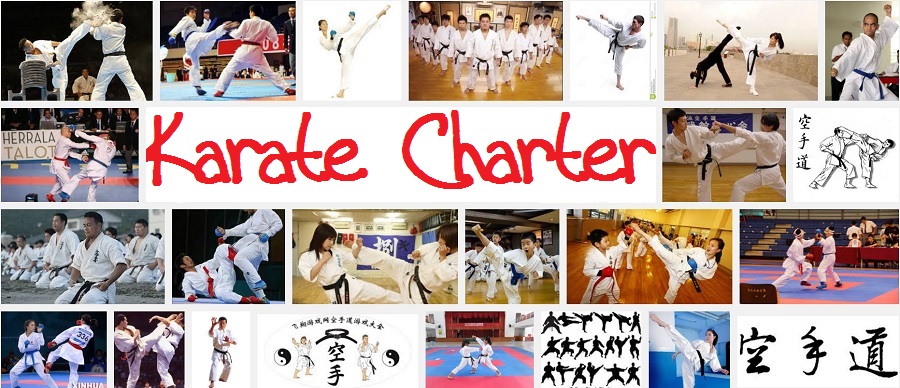On 23 April, 1987, the Japanese Budō Association (Nippon Budō Kyōgikai) established the so-called Budō Charter. It was meant to serve as a modern interpretation and guideline of Japanese Budō. Although it is not an official government decree and therefore not legally effective, it has a strong normative character. On 16 September, 2004, the Budō Charter for Young People was added by the same association.
More recently – on June 5, 2010 – the Japan Karate Federation (JKF) followed up with their own Charter of Karate-dō. It can be seen as a sort of semi-official national-level Dōjōkun. It follows here in translation. I think it has been translated here for the first time into English. It is a first tentative version. Any input on the translation is welcome.
The Charter of Karate-dō
Karate-dō developed in Okinawa as an original empty-handed martial arts (bujutsu) of our country (Japan). Within the process of domestic dissemination, and while it inherited the spirit of ancient Japanese martial arts (budō), it developed from a technique (jutsu) to a Way (dō) as a characteristic Japanese martial arts (budō) of our country (Japan).
Once a martial arts (budō), it is not only about learning and training the martial techniques, but has been developed as a method of practicing and tempering the mind and the body in accordance with the teachings of the unity of spirit and technique and for cultivating etiquette (rei).
Like this with the traditional spirit of martial arts (budō) handed down within Karate-dō, it has played a considerable role in the personality development of many Japanese persons who learned Karate-dō.
In addition, today’s Karate-dō – having spread from domestic Japan to countries all over the world – made a significant contribution to the realization of world peace through international exchange and to the development of healthy and capable youths.
Not being biased towards the acquisition of technical skill only, and without forgetting that the essence of Karate-dō is based on the spirit of martial arts (budō), we must strive – with high ethical standards – to contribute to the preservation and development of Japan’s traditional culture, and simultaneously honor the integrity and etiquette (rei) as Japanese citizens, to observe the rules of society, and to contribute to society, and in this way nurture promising human resources which are respected by society.
Here we publish the “The Charter of Karate-dō of the Japan Karate Federation (JKF), Incorporated Foundation“, as the fundamental guidelines for the sake of further development of Karate-dō.
ARTICLE 1: OBJECTIVE OF KARATE-DŌ
The objective of Karate-dō is to forge a strong body through the daily training (cultivation) of mind and body, to cultivate the character (personality), and to foster physically and mentally capable persons.
ARTICLE 2: MENTAL ATTITUDE
Those who aspire to practices of Karate-dō, in order to maintain the quality and dignity of Karate-dō, shall endeavor to cultivate the qualities (ethical standards) of propriety, sense of justice, morality, self-discipline, and courage.
ARTICLE 3: PRACTICE
As regards practice, train in accordance with “Practice begins with courtesy, and ends with courtesy”, stress the basics (kihon), and seek to master the techniques in accordance with harmonizing heart, technique, and physique (shingitai).
ARTICLE 4: COMPETITIONS
In participating in competitions and demonstrations, fully exhibit the three qualities of the unity of heart, technique, and physique (shingitai) achieved in your regular practice. In Kumite competition pay attention to safety, adhere to the rules, don’t solely indulge in the idea of victory or defeat, and always stick to a moderate attitude.
ARTICLE 5: THE PRACTICE VENUE
Do not forget that the practice venue (dōjō, gymnasium, etc.) is a place to cultivate the mind and the body, to observe etiquette (courtesy), and to maintain strict discipline. At the same time strive to maintain it a quiet, clean, and safe environment.
ARTICLE 6: TEACHING AND POPULARIZATION
The leaders (trainers) must be persons respected by society who constantly polish their character with a high sense of ethics, who encourage the research and the physical and mental training of techniques, and who are adequate persons of character at all times.
In addition, when it comes to teaching, the leaders (trainers) shall endeavor to create a moderate teacher and student relationship of respect and affection with those who receive instruction, in accordance with strict ascetic practice and safety management.
As regards popularization, regardless of gender, age, and the presence or absence of a disability, without a one-sided bias on mainly spreading the techniques, you should strive to acquire a spirit of self-responsibility and fair play, exhibit compassion and gentleness towards other people, always comply with social rules (norms), acquire a high sense of ethics, and develop human resources which are respected by society.
Japan Karate Federation (JKF), Incorporated Foundation

© 2016, Andreas Quast. All rights reserved.
